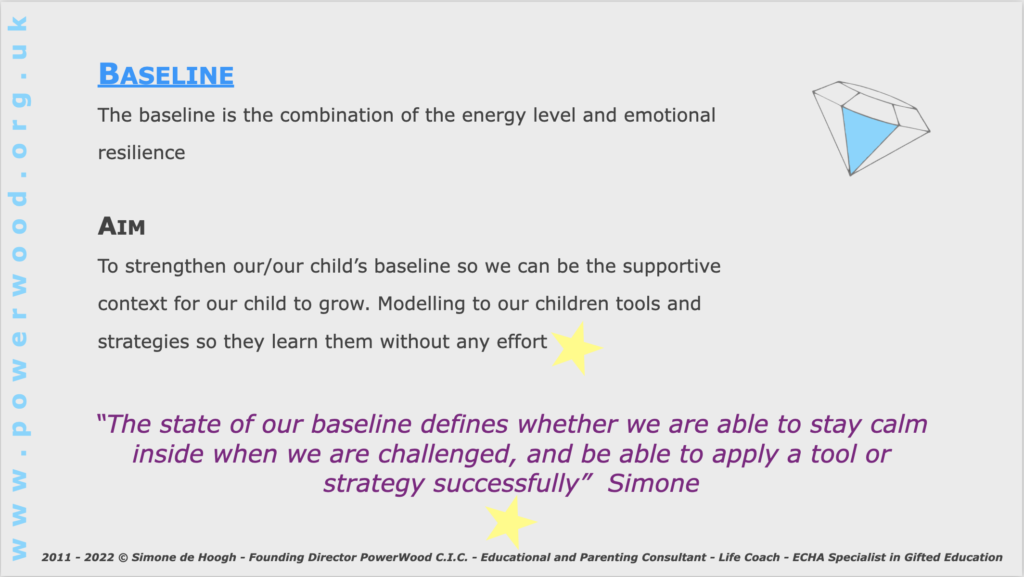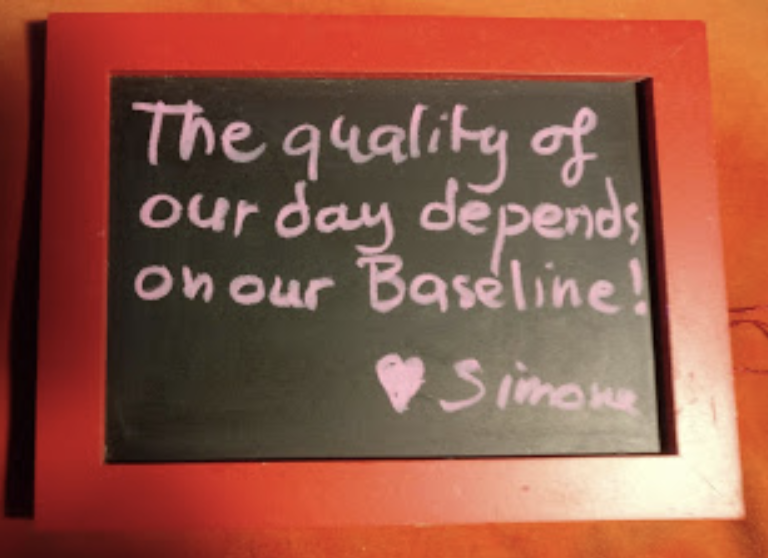Baseline is one of the main concepts in the Multilevel Emotional Regulation Theory (MERT) developed by Simone de Hoogh.
In PowerWood we always talk about our Baseline. What do we mean by that?
Our well-being is hugely influenced by two things: our Energy level and emotional resilience. We call that our Baseline.

How high or low our Baseline is defines if in a situation we are able to keep our cool, keep our eye on the target and direct our energy associated with our heightened intensity and sensitivity towards our own chosen goals and applying the PowerWood Tools or if the emotions run wild and/or the situation escalates, whether it is with an attack of despair or anger in ourselves or focus on our child, and we lose control and have further negative experiences. It is really important to reduce all unnecessary stressors or irritations in order to have a high Baseline.
Part of raising our baseline is to bring awareness to ourselves. You can ask yourself :
- How high or low is my energy level?
- Do I have enough energy to keep on top of things?
- Do I have excess energy to do something new?
- How bouncy is my emotional resilience?
- Do I get easily upset if something doesn’t work the way I want or am I able to take it and use it towards achieving a goal?
We believe that the level of our Baseline defines if we are able to prevent an internal or external escalation in ourselves happening – or other family members. The strength of our Baseline defines if we are able to direct our energy towards self-chosen goals or if we fall back into childhood patterns (or as we call them Involuntary Mechanisms (IM)) and get stuck in the Cycle of Emotional and/or Sensory Overload.
The Multilevel Emotion Regulation Theory (MERT) is giving understanding, practical tools and strategies to apply in the moment to prevent escalation and help to strengthen the Baseline in general while staying compassionate with ourselves and others.
Explore practical tips to improve you baseline, even for when you’re feeling really low.
Low Key self-care explained by Simone
How I get back on track or my list of low-key self care tools by Tine
Top 3 Tips to Up your Baseline (Energy and Resilience Level) by Simone
PowerWood’s Community
Find understanding, tools and strategies that work in an understanding, respectful and compassionate Community.
PowerWood can be your and your families advocate and your second family.
Explore how joining our PowerWood community by becoming a member will benefit you and your family and what types of memberships are available.
Join our Community
Available to Members*
*Booking a one-off Free Introductory Talk of 45-60 minutes by Skype or FaceTime with Senior Consultant Simone de Hoogh is one of the benefits of being either a FreeBee PowerWood Community Member or a Friend PowerWood Community Member.
Book a FREE Introductory Talk with a Professional*
You can read more about PowerWood’s Consultancy Sessions, the Benefits of a Free Introductory Talk and PowerWood’s Consultancy Services Tiered Fee Structure.
*Overexcitability Test
OE (Overexcitability) is an element of a Developmental Theory –Theory of Positive Disintegration by Dabrowski- that is one of the underpinning theories of MERT (Multi-level Emotion Regulation Theory) developed by Simone de Hoogh. Overexcitability explains and allows us to look at ‘extreme’ behaviour as a valuable asset in our or our children’s life.
Find out if you or your child has OE (OverExcitability) as well
*Boundary Test
A HUGE thank YOU to the son and daughter of Ernest Hartmann’s who gave PowerWood permission to use and put the full academically approved questionnaire about the Boundary in the Mind on PowerWood’s website.
Check how the Boundary in the Mind affects you or your child

